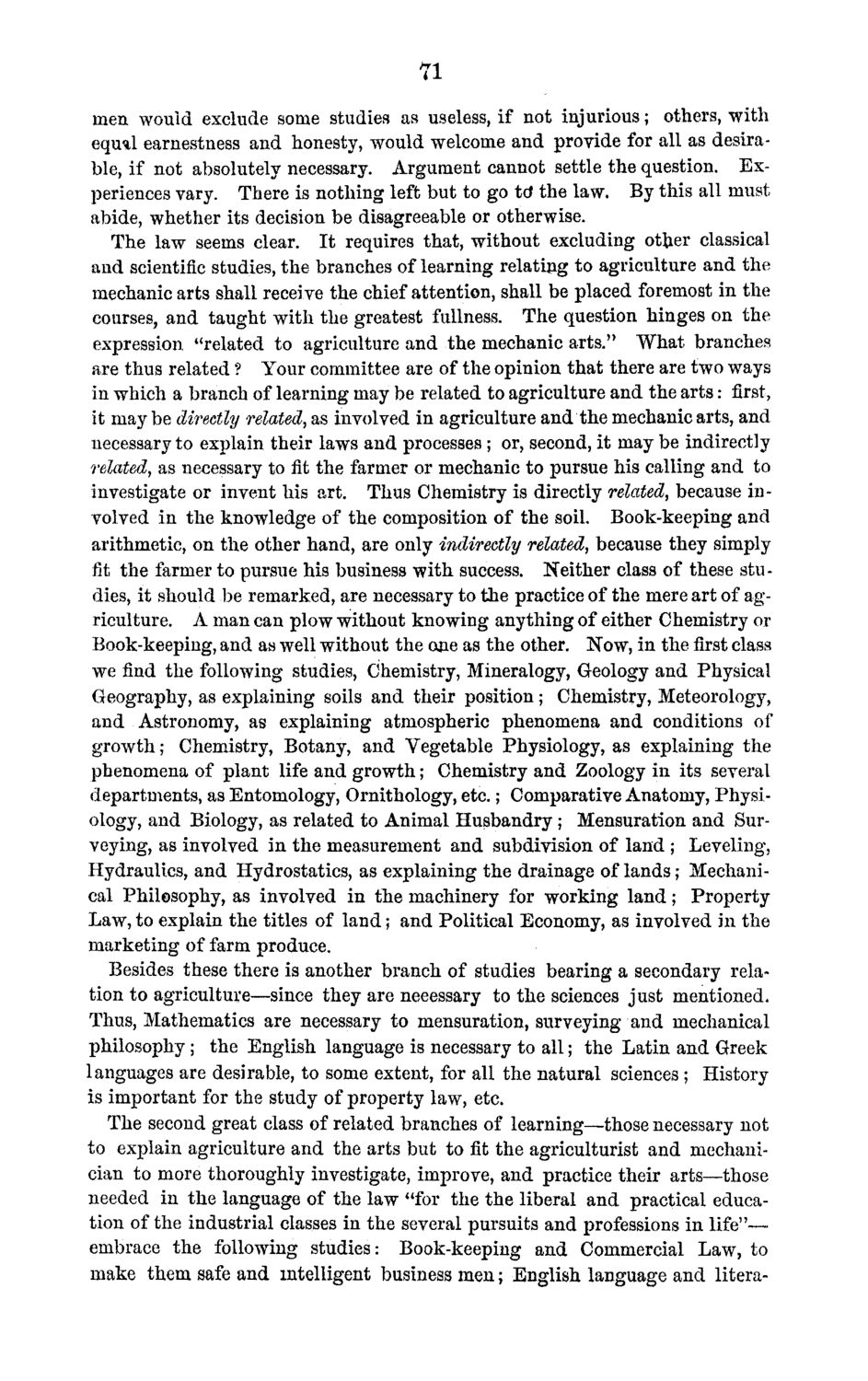| |
| |
Caption: Board of Trustees Minutes - 1870
This is a reduced-resolution page image for fast online browsing.

EXTRACTED TEXT FROM PAGE:
71 men would exclude some studies as useless, if not injurious; others, with equal earnestness and honesty, would welcome and provide for all as desirable, if not absolutely necessary. Argument cannot settle the question. Experiences vary. There is nothing left but to go to* the law. By this all must abide, whether its decision be disagreeable or otherwise. The law seems clear. It requires that, without excluding other classical and scientific studies, the branches of learning relating to agriculture and the mechanic arts shall receive the chief attention, shall be placed foremost in the courses, and taught with the greatest fullness. The question hinges on the expression "related to agriculture and the mechanic arts." What branches are thus related ? Your committee are of the opinion that there are two ways in which a branch of learning may be related to agriculture and the arts: first, it may be directly related, as involved in agriculture and the mechanic arts, and necessary to explain their laws and processes; or, second, it may be indirectly related, as necessary to fit the farmer or mechanic to pursue his calling and to investigate or invent his art. Thus Chemistry is directly related, because involved in the knowledge of the composition of the soil. Book-keeping and arithmetic, on the other hand, are only indirectly related, because they simply fit the farmer to pursue his business with success. Neither class of these studies, it should be remarked, are necessary to the practice of the mere art of agriculture. A man can plow without knowing anything of either Chemistry or Book-keeping, and as well without the one as the other. Now, in the first class we find the following studies, Chemistry, Mineralogy, Geology and Physical Geography, as explaining soils and their position; Chemistry, Meteorology, and Astronomy, as explaining atmospheric phenomena and conditions of growth; Chemistry, Botany, and Vegetable Physiology, as explaining the phenomena of plant life and growth; Chemistry and Zoology in its several departments, as Entomology, Ornithology, etc.; Comparative Anatomy, Physiology, and Biology, as related to Animal Husbandry; Mensuration and Surveying, as involved in the measurement and subdivision of land ; Leveling, Hydraulics, and Hydrostatics, as explaining the drainage of lands; Mechanical Philosophy, as involved in the machinery for working land; Property Law, to explain the titles of land; and Political Economy, as involved in the marketing of farm produce. Besides these there is another branch of studies bearing a secondary relation to agricultuve—since they are neeessary to the sciences just mentioned. Thus, Mathematics are necessary to mensuration, surveying and mechanical philosophy; the English language is necessary to all; the Latin and Greek languages are desirable, to some extent, for all the natural sciences; History is important for the study of property law, etc. The second great class of related branches of learning—those necessary not to explain agriculture and the arts but to fit the agriculturist and mechanician to more thoroughly investigate, improve, and practice their arts—those needed in the language of the law "for the the liberal and practical education of the industrial classes in the several pursuits and professions in life"— embrace the following studies: Book-keeping and Commercial Law, to make them safe and intelligent business men; English language and litera-
| |